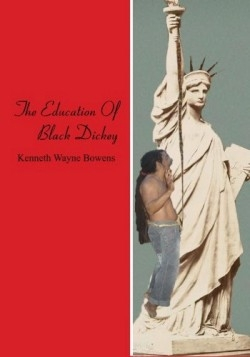The Education of Black Dickey
Sheets of rain battered protagonist Kayin’s head and red Oklahoma mud clogged his nose and mouth. The racist cop had him trussed up and laying helplessly on the ground outside of his car. What began as a simple favor, giving his cousin and two friends a lift downtown before heading to an important college exam, brought Kayin’s secure world and bright future to an end. The cops claimed they found a bag of crack cocaine in the car, and the so-called justice system cranked like an automatic sausage machine, incasing Kayin in prison for four long years where he went from naïve and promising engineering student to convict.
Author Kenneth Wayne Bowens is an Oklahoma native who has written two plays, studied psychology, acting, and improvisation. He is one of the founding members of the African American Writer’s Alliance (Seattle) and is a life-long activist whose work includes facilitating discussions on race relations. The Education of Black Dickey is his second novel. His first, Dirtied Brown Leaves, was released in 1996.
During his trial, Kayin stares at the photographs of four white male judges behind the bench. “They all had their own unique solemn frown of distinction. And I assumed these men were on the bench during Jim Crow,” he says. “They were honored as the history of justice in Oklahoma City. I wondered how many black families had they hurt, killed, and treated like second classed citizens because of the unjust segregated laws?”
In prison, Kayin dreams of his predecessors, escapees from the brutal system of slavery who arrived in Oklahoma when it was still dominated by Native-Americans. Their stories unfold, revealing the deep racist roots of Oklahoma that still influence the behavior of the present-day white population. Kayin’s visions take him through land-grabs that pushed rightful black owners off their property, a horrible lynching campaign, and the 1921 race riot in Tulsa that left hundreds of people of color dead and 10,000 homeless.
Along for the ride is Kayin’s anthropomorphic sexual organ, named Black Dickey by his girlfriend. Like the Blaxploitation films of the 1970s, Bowens embraces the stereotype of black male ultra-virile sexual prowess. In this case, Black Dickey is essentially Kayin’s alter ego, surging and withering, pleasing all comers, and acting like a highly intrusive and opinionated Greek Chorus. While he never actually speaks, Black Dickey’s exploits provide both steamy sexual encounters and occasional comic relief.
The narrative swings wildly from a historical document of the struggle of African-Americans against oppression to gynecologically precise descriptions of sex, and not simply a few. This novel is strictly for an adult audience. There are dream sequences, flashbacks, reprints of the legislative history of segregation, and blurbs about recent police abuses. The book’s form is experimental, but not entirely successful. Unfortunately it gets bogged down in the repetitively written exploits of Black Dickey. Nevertheless, Bowens’ style is creative, and anyone who wonders about black history, the impact of slavery and segregation, or the prison system will find much to learn here.
Disclosure: This article is not an endorsement, but a review. The publisher of this book provided free copies of the book and paid a small fee to have their book reviewed by a professional reviewer. Foreword Reviews and Clarion Reviews make no guarantee that the publisher will receive a positive review. Foreword Magazine, Inc. is disclosing this in accordance with the Federal Trade Commission’s 16 CFR, Part 255.

